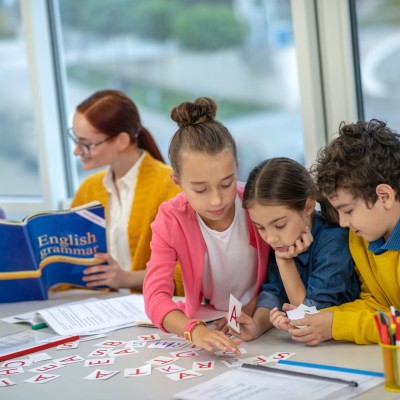In learning a new language, we usually focus on vocabulary, grammar, and pronunciation. But, to really become fluent and understand the language deeply, we must pay attention to another important area—soft skills.
Soft skills are different from hard skills, which is about technical know-how. Soft skills deal with how we connect with others and handle different situations. This blog will show you why soft skills matter in language learning, and how these skills can change your language experience and help you communicate effectively.
The Importance of Soft Skills in Language Learning
Language is more than just speaking. It is a way to connect with people from different backgrounds, as it helps us understand their views and have more important, meaningful, and personal discussions. To really enjoy a language, we must do more than just learn words and grammar. We should focus on soft skills, too.
These skills help people who learn a language handle social situations better, help them understand cultural details, and make friends with native speakers. As you practice and get more comfortable with your target language, your confidence and skills will grow together.
Understanding the Role of Soft Skills
Before we look at the specific soft skills that help us learn languages, we need to understand what these skills mean. They include abilities related to working with others, communication, and managing ourselves. These skills help us interact with people, understand our feelings, and handle social situations better.
One important soft skill, for example, is emotional intelligence. This means being aware of our emotions and those of others. It helps us manage how we feel and build strong connections with people. When learning a language, emotional intelligence is key for understanding others, listening actively, and being sensitive to different cultures. All of these things help us communicate better.
Additionally, soft skills give language learners the ability to adapt and bounce back when facing challenges. They help us accept new cultures and keep going in our language studies. By developing these skills, we can create a positive attitude and a growth mindset that will help us learn languages more effectively.

How Soft Skills Complement Language Acquisition
Imagine this: you know the grammar of your target language well. Yet, you find it hard to have a simple conversation. This is often due to feeling nervous or not catching how a native speaker speaks. This shows us that soft skills are very important, as they help connect what you know in theory with how you talk in real life.
Good time management is an important soft skill as it helps language learners create a steady daily routine for learning English. You can focus on what you need to learn and get the most from your study time. When you put things off, your language learning suffers. So, building good time management habits can really help you reach your goals in fluency.
Also, problem solving skills are very useful when you face language troubles or new cultural situations. If you look at these moments as chances to grow, you become resourceful and flexible. These are important for learning a new language.
Key Soft Skills for Successful Language Study
Here are some important soft skills that can help you learn and use a new language with confidence:
Communication Skills: The Heart of Language Learning
Great communication skills are very important for learning a language. While grammar and vocabulary are the foundations of learning a language, communication is what brings them to life.
Think about getting into your dream university because you shared your skills well, even if your grammar was not perfect. Also, picture yourself traveling easily in a new country by asking for directions and understanding the answers. These examples show how important communication skills are; they go beyond what you learn from books.
To build strong communication skills, you need to listen actively. You should express your thoughts clearly and adjust your way of talking depending on the situation. When you focus on these skills, you can join lively chats, grow relationships with native speakers, and enjoy the full experience of the language you are studying.

Adaptability in a New Cultural Context
Learning a language lets you see into a new culture and understand cultural differences. It brings along special customs, traditions, and social rules. In this new space, being flexible is a key soft skill.
Being adaptable means accepting cultural differences with an open mind. You have to understand that communication may be different from what you know, so be prepared to step outside your comfort zone and be ready for fresh experiences. You should also realize that making mistakes is part of learning, so take mistakes as an opportunity to improve.
As you become more adaptable, you will understand cultural differences better. This will help you connect with native speakers and, in the world of education, this skill of accepting and celebrating diversity and fitting into various communication styles is very valuable.
Teamwork and Collaboration Abroad
The joy of learning a language often comes from how it connects people. When you join language exchange programs, online study groups, or chat with native speakers, you need to use teamwork and collaboration.
Think about working on a group project with international students, you must communicate well to reach a shared goal. This shows how teamwork is important in all education, not just in your language learning efforts. It means listening carefully, respecting other views, and wanting to clear up misunderstandings.
When you collaborate while learning a language, you boost your language skills, and you gain crucial social skills that go beyond just speaking fluently. These experiences help you value different opinions, understand cultural gaps, and build strong relationships.
Developing Soft Skills in Immersive Environments
Learning a language in an immersive setting gives you a great chance to learn faster and improve your soft skills at the same time. When you are surrounded by the language you want to learn, you get to hear people use it in real situations, learn about the culture, and get more chances to practice talking with others.
This experience is much more than using books and language learning apps. It forces you to deal with real-life situations where your soft skills are important for good communication and understanding the culture. Take these chances and step outside your comfort zone, you will see how much immersive language learning can change you.

Strategies for Enhancing Communication Skills
Boosting your communication skills in a new language involves different steps. You need to practice actively and be open to new experiences. Here are some strategies to improve your skills:
- Engage in Active Listening: Focus on how native speakers talk. Notice their tone, body language, and cultural hints. Ask questions if you don’t understand to show you care about their words.
- Embrace Real-World Interactions: Go beyond your comfort zone. Talk with native speakers when you can. Look for language exchange partners, join local events, or connect with online groups.
- Observe and Imitate: Watch movies and TV shows to improve your English, or listen to podcasts in your target language. Focus on how words are pronounced and the way phrases sound. Try to copy these in your own speaking practice. For example, use shadowing techniques where you mimic a native speaker to get better at speaking and pronouncing words.
Activities to Boost Your Adaptability
Thriving in a new culture and language takes flexibility. You need to be ready to handle new situations with an open mind and a desire to learn. Try these activities to help you adapt better:
- Immerse Yourself in Cultural Experiences: Go to local events, taste traditional food, or visit historical places. This helps you learn more about the culture.
- Challenge Yourself with Language Exchange: Work with a native speaker to practice both languages. This will help your language skills and expand your cultural knowledge.
- Travel or Explore Online Communities: If you can, visit a country where the language is spoken. If not, join online groups to talk with native speakers and learn about their culture.
Handling these new situations takes flexibility and a readiness for surprises. By getting involved in these activities, you will build resilience and resourcefulness, which helps you adapt to any situation. Also, effective time management is key for adding these activities into your daily or weekly plans.
Cultivating Teamwork Through Language Practice
Language learning benefits when people work together. It’s important for learners to help each other, practice their skills, and share experiences. Here are some ways to build teamwork while practicing a new language:
- Join group activities that include group discussions, role-playing, or projects together. These types of tasks make everyone join in, talk to each other, and solve problems as a group.
- Keep in mind that each person in the group has different strengths and weaknesses. By working together, learners can help each other grow and make the learning experience better and more fun.
- When learners work well together, they create a positive effect. Everyone benefits from shared knowledge, different views, and support from each other. This not only improves language skills but also builds teamwork abilities that are useful in personal life and at work.

Overcoming Language Anxiety with Soft Skills
Language anxiety is a common challenge for people learning a language. It can slow down their progress and stop them from enjoying the learning process. However, using soft skills can help as they can relieve anxiety and create a more confident and enjoyable learning experience.
By working on building your confidence through good communication and finding ways to solve language problems, you can turn anxiety into a chance to grow. Keep in mind that every little interaction helps you move closer to fluency and understanding of the culture.
Building Confidence Through Effective Communication
Building trust in your communication skills is very important to reduce language anxiety. Focus on making progress instead of trying to be perfect. Know that making mistakes is a normal part of learning.
Instead of worrying about what others think, see every conversation as a chance to practice. This lets you get feedback and improve your communication style. Remember, even people who speak the language fluently make mistakes, yet they still connect effectively with others.
As you join more conversations and have successful communication experiences, your confidence will grow. This will help you speak more smoothly and enjoy connecting with others in your chosen language.

Problem-Solving Skills for Language Learners
Encountering language barriers is a part of learning a new language. However, you can change these challenges into growth opportunities by developing strong problem-solving skills. Instead of seeing these hurdles as failures, approach them with critical thinking and a desire to find different solutions.
For instance, if you find a grammar concept difficult, don’t feel discouraged. Break the problem into smaller parts, look for other explanations, or ask a tutor or a language partner for help. Actively finding solutions helps deepen your understanding and gives you the skills needed for future challenges.
By building this problem-solving mindset, you become a more independent and smart learner. You can navigate the tough parts of learning a language with confidence. Keep in mind that each challenge you face helps you progress and strengthens your chances of success in your language learning journey.
Practical Applications of Soft Skills in Language Use
Having looked at the important soft skills for learning a language, let’s now talk about how to use them in real life. Knowing that these skills are important is one thing, but seeing how they help you feel confident in language and cultural settings is another.
When you are ordering food at a restaurant, taking part in a business meeting, or chatting with a native speaker, soft skills make a big difference. They help you turn what you know into real-life speaking, and this change takes you from just a language learner to someone who can communicate with confidence.

Navigating Real-Life Language Situations
Learning a language is more than just reading books and sitting in class. It’s about using the language confidently in real situations. This means applying a practical approach. You should mix your language skills with soft skills for better communication.
Think about it. When you travel and need to ask for directions, staying calm and using polite body language helps a lot, and clearly saying your question makes for a more positive interaction. Plus, using active listening skills during talks with native speakers lets you connect at a deeper level.
Each conversation is a chance to improve your language use. You should change your way of communicating to fit each situation. It’s important to see these real-life experiences as ways to grow your confidence. They help you refine your skills and feel more at ease using the language naturally.
Soft Skills for Long-Term Language Proficiency
The journey of language acquisition extends far beyond achieving basic fluency. It’s an ongoing process of personal growth and development that enhances not only your language proficiency but also your interpersonal skills, cultural understanding, and overall effectiveness as a communicator.
The table below highlights how cultivating soft skills contributes to long-term language proficiency.
|
Soft Skill |
Impact on Language Proficiency |
|
Communication Skills |
Enhances fluency, clarity, and effectiveness in expressing ideas and engaging in conversations. |
|
Adaptability |
Enables adjustment to different communication styles, cultural contexts, and unexpected situations. |
|
Teamwork and Collaboration |
Fosters language practice through shared experiences, diverse perspectives, and mutual support. |
|
Problem-Solving Skills |
Equips learners with strategies to overcome linguistic challenges, fostering resilience and resourcefulness. |
|
Confidence Building |
Empowers learners to communicate effectively, reducing anxiety and promoting active language use. |
By embracing these soft skills as integral components of their language learning journeys, individuals pave the way for long-term success and unlock their full potential as effective communicators.
Developing Soft Skills for Effective Language Study: Final Thoughts
In conclusion, it is important to develop soft skills for studying languages well. Skills like communication, adaptability, and teamwork help you learn a language faster and better.
When language learners work on these skills in real-life settings, they can feel less anxious and handle language situations more easily. Building these skills helps with language learning and gives room for personal growth and a better understanding of culture. Embrace your language learning journey by improving your soft skills. This will help you become a better and more skilled language learner.
Frequently Asked Questions
What are the top soft skills needed for language learning?
The most important soft skills for learning languages effectively are communication, adaptability, time management, problem-solving, and teamwork. These skills can help you do better in learning and using a language in different settings. They are important things to add to your CV, or curriculum vitae.
How do soft skills reduce language anxiety?
Soft skills like emotional intelligence, social skills, and communication help reduce anxiety. They do this by building confidence, encouraging a positive mindset, and promoting effective interactions. When learners focus on these skills, they feel more secure and less worried in language situations.





